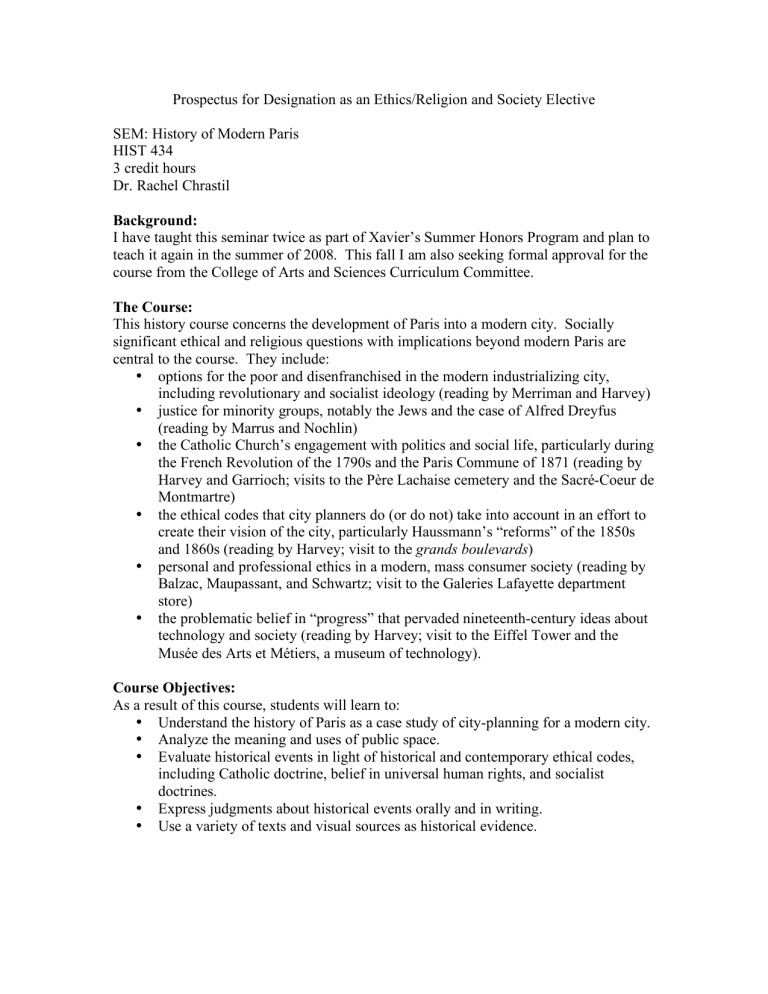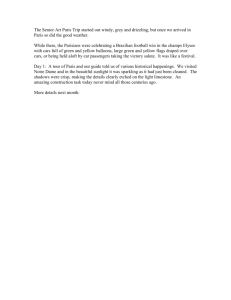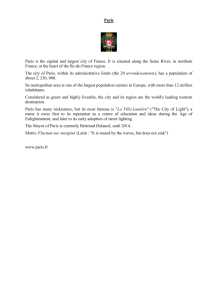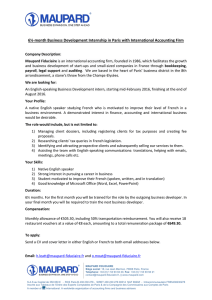Prospectus for Designation as an Ethics/Religion and Society Elective HIST 434

Prospectus for Designation as an Ethics/Religion and Society Elective
SEM: History of Modern Paris
HIST 434
3 credit hours
Dr. Rachel Chrastil
Background:
I have taught this seminar twice as part of Xavier’s Summer Honors Program and plan to teach it again in the summer of 2008. This fall I am also seeking formal approval for the course from the College of Arts and Sciences Curriculum Committee.
The Course:
This history course concerns the development of Paris into a modern city. Socially significant ethical and religious questions with implications beyond modern Paris are central to the course. They include:
• options for the poor and disenfranchised in the modern industrializing city, including revolutionary and socialist ideology (reading by Merriman and Harvey)
• justice for minority groups, notably the Jews and the case of Alfred Dreyfus
(reading by Marrus and Nochlin)
• the Catholic Church’s engagement with politics and social life, particularly during the French Revolution of the 1790s and the Paris Commune of 1871 (reading by
Harvey and Garrioch; visits to the Père Lachaise cemetery and the Sacré-Coeur de
Montmartre)
• the ethical codes that city planners do (or do not) take into account in an effort to create their vision of the city, particularly Haussmann’s “reforms” of the 1850s and 1860s (reading by Harvey; visit to the grands boulevards )
• personal and professional ethics in a modern, mass consumer society (reading by
Balzac, Maupassant, and Schwartz; visit to the Galeries Lafayette department store)
• the problematic belief in “progress” that pervaded nineteenth-century ideas about technology and society (reading by Harvey; visit to the Eiffel Tower and the
Musée des Arts et Métiers, a museum of technology).
Course Objectives:
As a result of this course, students will learn to:
• Understand the history of Paris as a case study of city-planning for a modern city.
•
Analyze the meaning and uses of public space.
•
Evaluate historical events in light of historical and contemporary ethical codes, including Catholic doctrine, belief in universal human rights, and socialist doctrines.
• Express judgments about historical events orally and in writing.
• Use a variety of texts and visual sources as historical evidence.
Discussion:
As a seminar, the course relies heavily on the reading of texts and student discussion and debate, rather than lecture.
Students will apply the critical approach to ethical questions learned in THEO 111 and
PHIL 100 to a particular historical context. Just as they have learned to examine and articulate ethical responses to life’s most profound questions through the understanding of Christian theology and Plato’s Republic , they will analyze the ethical responses to events in Paris.
In our discussions, students will identify the ethical codes that guided historical actors, including: Catholic doctrine, belief in universal human rights, and socialist doctrines. We will discuss the ways that these ethical codes have overlapped or conflicted at particular moments, such as during the Paris Commune of 1871, and evaluate historical choices in light of these ethical codes.
As a result of this discussion, the fact that this course is an E/RS elective will be consistently reiterated.
Evaluation:
Students will write a series of reading responses that reflect upon these ethical issues.
They will also prepare a final project, an “alternative guidebook,” that engages with these issues through additional reading and on-site research. The guidebook format encourages students to develop topics that are personally meaningful and that will shape their thinking beyond their experiences in Paris.
In all of their written assignments, students will be assessed on the nuance and complexity of the argument and historical analysis (including their ability to connect historical events to ethical issues); the support they provide for their arguments; the structure of their work; and their grammar, writing style, and presentation.
SEM: History of Modern Paris
HIST 434
Summer 2007
Dr. Rachel Chrastil
Daily 1:00-3:00
Office Hours: by appointment chrastilr@xavier.edu
Due to its broad boulevards, showcase landmarks, sidewalk cafés, material wealth, and artistic communities, Paris has been called the Capital of the Nineteenth Century, the
Capital of Modernity, and even the Capital of the World. Paris acquired its reputation both by design and by accident during the nineteenth century, a period when artists rubbed shoulders with shop clerks, when industrialization transformed the workplace and the home, and when revolution brought moments of hope and despair. In this course, we will seek to understand these historical changes and interpret their meaning today.
Topics include: the legacy of Napoleon; the revolutions of 1830 and 1848; the construction of boulevards and public works; the arts and leisure; industrialization, communication, and transportation; the Franco-Prussian War and Paris Commune; international expositions; and the Dreyfus Affair.
The course includes on-site visits to the Arc de Triomphe, the Musée des Arts et Métiers, the Opéra Garnier, Père Lachaise cemetery, the Sacré-Coeur de Montmartre, the Musée d’Orsay, and the Eiffel Tower. We will also include a study trip to Strasbourg to compare the history of that cosmopolitan city with developments in Paris.
Ethics/Religion and Society Elective
[Should this course be approved for E/RS credit:]
This course has been designated as an E/RS elective. Socially significant ethical and religious issues with implications beyond modern Paris are central to the course. We will investigate these issues by:
•
Discussing texts on ethical debates, including: the ethics of city planning, the
Catholic Church’s engagement with politics and social life, the problematic belief in “progress,” options for the poor and disenfranchised in the modern city, justice for minority groups (notably Jews and the case of Alfred Dreyfus), and personal and professional ethics in a modern, mass consumer society.
• Identifying the ethical codes that guided historical actors, including: Catholic doctrine, belief in universal human rights, and socialist doctrines; understanding the ways that these ethical codes have overlapped or conflicted.
• Evaluating historical choices in light of these ethical codes.
• Visiting and analyzing sites in Paris where these issues were debated historically
(notably the Père Lachaise cemetery and the Sacré-Coeur de Montmartre).
•
Writing reading responses that reflect upon these issues.
• Writing a final project that engages with these issues through additional reading and on-site research.
Some questions we will explore in this course:
• Is a city planned or does it just happen?
• What are the ethical implications of city planning?
•
Who controls Paris? Who belongs to or owns the city?
•
What were the competing visions of Paris during the nineteenth century?
• What must be destroyed in order to build and plan?
• What is modern? What does it mean to say that Paris became modern city during the nineteenth century?
•
How does politics put its stamp on a city?
• Who gives meaning to public monuments, and how does this meaning change over time?
Course Objectives: As a result of this course, students will learn to:
•
Understand the history of Paris as a case study of city-planning for a modern city.
•
Analyze the meaning and uses of public space.
• Evaluate historical events in light of historical and contemporary ethical codes, including Catholic doctrine, belief in universal human rights, and socialist doctrines.
•
Express judgments about historical events orally and in writing.
• Use a variety of texts and visual sources as historical evidence.
Books (to be purchased before the trip and brought to Paris):
Balzac, Honoré de. Old Goriot . New York: Penguin Classics, 1951.
Maupassant, Guy de. Bel-Ami . New York: Oxford World Classics, 2001.
Schwartz, Vanessa R. Spectacular Realities: Early Mass Culture in Fin-de-Siècle Paris .
Berkeley: University of California Press, 1998.
E-reserves (please print before you leave for France and bring with you)
Merriman, John. Modern Europe . 2 nd ed. New York: Norton, 2004.
644-651 (Restoration and Revolution of 1830);
670-676 (early 1848);
684-685 (late 1848);
696-701 (Agony of the Republic and Legacy of 1848);
795-801 (Second Empire);
801-805 (Franco-Prussian War and Paris Commune);
805-813 (Third Republic, 1871-1914).
Harvey, David. Paris, Capital of Modernity . New York: Routledge, 2003.
2. Dreaming the Body Politic: Revolutionary Politics and Utopian Schemes, 1830-1848 (59-89)
4. The Organization of Space Relations (107-16)
18. The Building of the Basilica of Sacré-Coeur (311-40)
Garrioch, David. The Making of Revolutionary Paris . Berkeley: University of California Press, 2002,
Epilogue, “The New Paris,” 303-19.
Marrus, Michael R. “Popular Anti-Semitism,” in Norman L. Kleeblatt, ed., The Dreyfus Affair: Art, Truth, and Justice . Berkeley: University of California Press, 1987, 50-61.
Nochlin, Linda. “Degas and the Dreyfus Affair: A Portrait of the Artist as an Anti-Semite,” in Kleeblatt,
96-116.
Course requirements:
Attendance and participation in all meetings and outings 20%
• This grade will drop precipitously if you miss class
Reading responses 20%
• More information to come
In-class presentation 20%
•
Prepared in advance – see assignment posted on our trip website
Final Project: Paris Alternative Guidebook 40%
• More information to come
Grades:
A = 93-100%
A- = 90-92%
B+ = 87-89%
B = 83-86%
B- = 80-82%
C+ = 77-79%
C = 73-76%
C- = 70-72%
D+ = 67-69%
D = 63-66%
D- = 60-62%
F = 59% and below
Strategies for Success:
•
Keep up with the reading and be prepared to participate in class.
•
Take advantage of resources such as the library and the Writing Center when preparing your final paper.
•
Stay in communication with me about your final paper – I can go over a draft with you.
Plagiarism:
Plagiarism, the use of someone else’s words or ideas without giving them proper credit, is a serious offense. Plagiarized assignments will receive an automatic zero and may result in a failing grade for the entire class . The instructor has the authority to refer cases of plagiarism to the proper disciplinary committee. Students should consult the student handbook for detailed school policy. You may wish to check out these websites for help in understanding what plagiarism is and how to avoid it:
• http://www.indiana.edu/~wts/pamphlets/plagiarism.shtml
• http://www.utoronto.ca/writing/plagsep.html
Students with Disabilities:
Students with disabilities will receive accommodations in this class as determined by school policy. Please visit the Learning Assistance Center or see me if you have any concerns.
Week 1
Monday
Introduction to the course
The French Revolution and Paris
Tuesday
The Legacy of the French Revolution and Napoleon
Reading and Response 1: Garrioch, “The New Paris”; Merriman, 644-51
Wednesday, on site
Arc de Triomphe
Thursday
Revolution of 1830 and July Monarchy
Reading and Response 2: Balzac, Old Goriot
Week 2
Monday
Industrialization, the Social Question, and 1848
Reading and Response 3: Harvey, “Dreaming the Body Politic”; Merriman, 670-76, 684-
85, 696-701
Tuesday, on site
Musée des Arts et Métiers
Wednesday
Second Empire and Haussmannization
Reading and Response 4: Harvey, “The Organization of Space Relations”; Merriman
795-801
Thursday, on site
Grands boulevards
Study Trip to Strasbourg, Friday-Saturday
Week 3
Monday
Franco-Prussian War and Paris Commune
Reading and Response 5: Harvey, “The Building of the Basilica of Sacré-Coeur”;
Merriman 801-5
Tuesday, on site
Sacré-Coeur de Montmartre and Père Lachaise Cemetery
Wednesday, on site
Musée d’Orsay
Thursday
Mass Culture
Reading and Response 6: Schwartz, Spectacular Realities ; Merriman 805-13
Week 4
Monday
Paris of the Third Republic
Reading and Response 7: Maupassant, Bel-Ami
Tuesday, on site
Eiffel Tower
Wednesday
The Dreyfus Affair
Reading and Response 8: Marrus, “Popular Anti-Semitism” and Nochlin, “Degas and the
Dreyfus Affair”
HIST 434 – SEM: History of Modern Paris
Final Project – Paris Alternative Guidebook
Research in Paris:
• Select five to ten sites or features of Paris that we have not discussed together.
They should be sites that are meaningful to you, and that you can think about historically and in light of the ethical questions we have discussed during this course. o The sites should make sense together – for example, they can be grouped thematically (revolutionary sites, churches, war memorials, means of communication, trade) or by neighborhood/area (the Latin Quarter,
Montmartre, the Champs-Elysées) o You may select a subject that is eighteenth, nineteenth, or twentieth century (or that crosses the centuries). o You MUST be able to put your sites in historical context. o You MUST discuss the sites in terms of ethical questions and codes. o Gather information on-site, including…
photographs
pamphlets or fliers
notes on the location, use, position, who visits this site (tourists?
Parisians? age/gender/class?)
government or other institutional presence
points of contention about how the site is used or what it means
Research back in the U.S.:
• Read at least five scholarly books related to your topic. o Two scholarly journal articles = one book o Please, no internet sources (unless they are electronic scholarly journals or e-books). o No encyclopedia articles
• Learn about the history behind these sites, as well as their current use and meaning. o You will need to think about the larger issues related to the site. For instance, if you want to write about the Invalides you may want to read books about the army since the hospital’s founding in 1670, French notions of glory and masculinity, the mystique of Napoleon, or poor relief.
Argument:
The list below provides possible subjects for your paper, but the argument is something different. It’s the message you want the reader to take away from the paper. Often (but not always) the argument is boiled down to one thesis statement , expressed in the opening paragraph, but the entire argument should unfold throughout the paper.
Questions to help you develop and add nuance to your argument:
•
Why did you select these sites, why are they significant as a whole, what do they tell us about Paris, France, history, the human condition?
• Do the sites today accurately reflect the histories that you read? Do they include information that the histories cannot convey? Or do they obscure information that you can only find using secondary sources?
•
How do these sites illuminate, complicate, or provide a framework for evaluating ethical dilemmas?
• What is at stake in what you are arguing? Why does this argument matter?
• What are the implications for future events?
•
What are the possible objections to this argument?
•
How did this subject change over time?
• Do the sources show any bias (either the sites themselves or the books)?
Structure:
Although your argument should show nuance and can be complex, it is very important to express it clearly.
•
Layout is up to you – be creative. o The text can flow all together, like a traditional paper, or be broken into sections, like a guidebook. o You may use a website like wayfaring.com to create an electronic guidebook.
•
You must include an introduction and conclusion that provide an argument concerning your sites.
• Is the argument easy to identify?
• Are the sections of the guidebook clearly indicated? Do they follow a logical order?
• Within sections of the guidebook, does each paragraph follow smoothly from the previous one?
•
Does the project move in a clear direction toward a final goal (the conclusion)?
Support:
•
Can you back up all the points of your argument with evidence?
•
Does your text support and explain the illustrations, photos or fliers?
• Do you avoid citing lengthy passages of text without justification?
• Do you avoid the overuse of generalizations?
• Have you included a bibliography?
• Have you cited your sources properly? Please cite both direct quotations and paraphrases. You can use any form of citation for this paper as long as you are consistent. Two common forms: o Turabian: http://www.lib.ohio-state.edu/guides/turabiangd.html
o Chicago Manual of Style : http://www.lib.ohiostate.edu/guides/chicagogd.html
Style and Grammar:
• Does the introduction make the reader want to keep reading? Try opening with a story, a seeming contradiction (or similarity) that you will complicate, or a problem to be solved.
•
Are sentence lengths and structures varied?
•
Try reading the text out loud to eliminate awkward sentences or transitions.
• Help is available at the Writing Center in Alter Hall – no matter how well you write, it is always a good idea to have someone else read your work.
Details:
•
Total word count: 3500-4000 words. Please include a word count.
• Due: Friday, September 14, 2007 by 4:00 in my office, Hinkle 306. o Late projects will be counted down 10%. No projects will be accepted after one week.
•
You must be independently motivated to develop this project, but I will be happy to help you shape the project both while we are in Paris and after we return.
• I will go over drafts with if you bring them in to my office.
• This assignment accounts for 40% of the course grade.
Suggested sites:
The Pantheon Shoah Memorial
The Louvre – the building and grounds, or specific works
Centre Pompidou
Picasso Museum
Rodin Museum
The Metro
The Seine
Catacombs
Musée d’Orsay – the building, or specific works
Place de la Concorde
Alexander III bridge
Grand Palais and Petit Palais
Luxembourg Garden
The Sorbonne
Street names
Musée des Égouts de Paris (Paris Sewers
Museum)
Musée Grévin
Jardin Atlantique (and WWII museum)
Mémorial des Martyrs de la Déportation
Place des Vosges
The Marais
Île de la Cité
Art and History of Judaism Museum
The Paris Mosque
Jardin des Plantes
Bois de Boulogne
Bois de Vincennes
Parc des Buttes Chaumonts
The Arènes de Lutèce (Roman ruins)
The Invalides
The Champ de Mars
The Champs-Élysées
The National Assembly
The Bourse
The Cluny Museum and garden
The Tuileries
Department stores
Open-air markets
The Palais Royale
Musée Carnavalet




